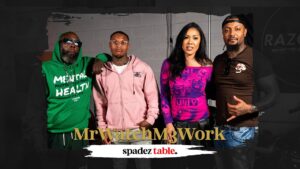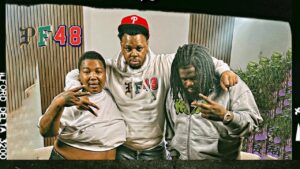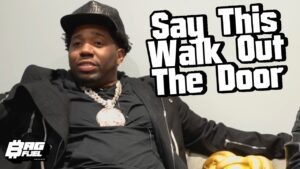Brooklyn rapper Kenny Capone sat down with Talk of the Town for an in-depth conversation about his musical journey, the Sweepers collective, and his approach to navigating the drill scene while maintaining his independence.
Before music became his primary focus, Capone was serious about basketball. He played AAU and high school ball, and remains confident about his skills on the court. However, music eventually took precedence around 2019-2020, when he decided to pursue rap seriously.
Growing up, Capone’s musical palette was diverse. He cites 50 Cent as his all-time favorite rapper and credits Chicago drill artists like LA Capone, King Von, Lil Durk, and Chief Keef as major influences. His stage name actually stems from LA Capone, whose music he discovered in middle school. The connection felt natural, especially after learning about the historical gangster Al Capone and researching the name’s meaning.
The Sweepers collective formally came together around 2021, though the core members grew up together. Capone was among the first to seriously pursue music videos and recording, with others gradually joining as they took rap more seriously. He describes the group as a franchise or brand where membership isn’t automatic—you need demonstrable talent and contribution to the team.
He draws an analogy to professional sports: just because someone claims to be part of a team doesn’t make them a player if they’re not putting in work or producing results. The collective holds each other accountable on consistency and quality.
When discussing the current state of drill, Capone pushes back against the notion that the genre is dying. He argues that drill has always been part of hip-hop, noting that many rappers throughout history have talked about similar content, just in different formats. However, he takes issue with how the genre has been modified, where artists feel pressured to diss deceased individuals or focus solely on violence to be considered authentic drill rappers.
Capone believes drill music should tell stories and create visuals for listeners, similar to playing video games, rather than being limited to one specific formula. He sees himself as versatile and considers himself a lyricist first, though he acknowledges that fans currently see him primarily as a drill artist based on his output.
Capone remains unsigned and approaches potential deals with caution. He’s educated himself on industry contracts and had lawyers review offers that he ultimately declined. His philosophy is straightforward: any deal must include master ownership, fair percentages, and reasonable terms. He’s not against signing but insists on proper compensation and structure.
On whether independent artists can succeed without major label backing, Capone is optimistic. He believes success comes down to work ethic, drive, and being in the right place at the right time. While he acknowledges labels provide resources and promotion, he’s confident those same resources can be accessed independently through networking.
When asked about comparisons to other artists, Capone takes it in stride. He’s been compared to various rappers but ultimately believes in his own abilities above all else. He respects artists on different sides of conflicts who are successfully supporting their families, though he’s quick to call out music he considers subpar.
Regarding collaborations, Capone admits pride sometimes gets in his way. He’s learning to reach out to artists he respects rather than waiting for them to come to him. He’s given props to artists like Nas EBK, Yi DG, Yami, and Chef G Fresh, showing he’s paying attention to talent across Brooklyn.
Capone doesn’t hold back when discussing police attention. He believes hip-hop police use music to justify their actions, even when lyrics don’t reflect actual criminal activity. He recounts being arrested during an interview where he was ironically discussing police harassment, an incident he describes as surreal given the timing.
On New York blogs and media, Capone offers measured criticism. He understands they have jobs to do but wishes there was better balance between posting conflict and promoting music. He specifically called out instances where pages only posted about him when negative news surfaced, despite ignoring his musical releases.
In a candid moment, Capone discussed breaking his hand due to anger issues. The injury taught him he’s not invincible and helped him work on impulse control. He describes having a low tolerance for disrespect but emphasizes he always shows love and respect first, knowing where things can escalate if necessary. He’s actively working on these issues and asked for patience as he improves.
Interestingly, Capone keeps his music from family members like his grandmother and mother out of respect, feeling uncomfortable playing profanity-heavy tracks around them despite their support of his career.
Capone has clear plans for the immediate future. He’s working on a project set to drop in July that’s currently 70 percent complete. He’s seeking one or two more features, ideally including a female artist, and is aiming for more uptempo, club-ready summer vibes rather than his typical sound.
He recently hit one million streams on a track without dissing anyone, which he considers a significant personal accomplishment. The milestone proved he could succeed on his own terms with his own sound and flow, rather than following trends or engaging in controversy.
Capone promises the upcoming run will showcase his versatility and remind people he’s more than just a drill artist. With videos in the pipeline and a strategic rollout planned, he’s betting on quality over rushing releases.






